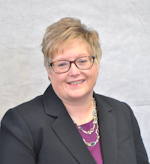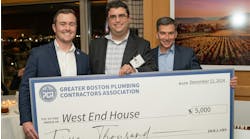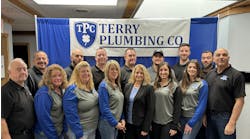Latest from Plumbing Contractor
Sponsored
In 2018, there were 19.2 million U.S. veterans — about 8 percent of the population, reports the U.S. Bureau of Labor Statistics. Unemployment among those veterans was 3.5 percent last year. For Gulf War II vets — those deployed from September 2001 to the present — the rate was 3.9 percent, the same as the national unemployment rate.
Employers are increasing their commitment to hiring military veterans, a 2017 CareerBuilder survey notes, with 40 percent of nearly 2,500 hiring managers and human resource professionals planning to actively recruit U.S. veterans over the next year.
Reasons for hiring veterans stems from what they learn during their military service, explains the Society for Human Resources Management in its “Employing Military Veterans” toolkit: leadership and teamwork; problem-solving and decision-making; honest and attention to detail; and global perspectives.
“Servicemen and servicewomen are required to react quickly and precisely, adapting to new information in dynamic, high-pressure situations,” notes the SHRM report. “Military service creates individuals who work to earn the respect of their peers and understand how to bring people together to pursue strategic, common goals.”
Those same attributes make veterans ideal candidates for entrepreneurs, specifically in the franchise community.
“We love welcoming military veterans into the Zoom Drain family because we know that veterans and franchising are a perfect match,” notes Zoom Drain President Jim Criniti, a U.S. Air Force veteran. “Those serving our country are very familiar with and dependent on operational systems, which is what franchising is all about."
Veterans account for 14 percent of U.S. franchises, even though they comprise only about 8 percent of the U.S. population, according to research by VetFran, a strategic initiative between the International Franchise Association and the Franchise Education and Research Foundation.
For franchises in the plumbing industry, U.S. military veterans are prime candidates to help fill the skilled labor gap. Many actively court veterans to run franchise operations as well as to work in the field.
Appeal of the Franchise Model
For the veterans we talked to, franchising wasn’t the first stop after leaving the service.
“Towards the end of my term in the armed forces, I started my own contracting company and was struggling to make it a success,” notes Lenny Siers, a technical sergeant when he left the U.S. Air Force with HVAC training. “As an individual contractor, finding ways to better my business and recruit other top talent was difficult. It was amidst that journey that I was introduced to One Hour Heating & Air.”
In 2005, he opened his first One Hour location in Niceville, Fla., and liked the franchise model so much that he branched out and opened a Benjamin Franklin Plumbing in 2010. Siers now has four plumbing franchises (the other three are in Pensacola, Fla.; Orlando, Fla.; and Birmingham, Ala.) with 140 trucks and more than 180 employees.
“I’m thrilled I made the decision, as franchising has proven solutions and systems that pave the way for success,” Siers explains.
Sean Hunt was a corpsman (a medic) when he left the U.S. Navy 18 years ago. “I wasn’t immediately attracted to franchising,” he recalls. “However, for the last 10 years, I have been out on my own, struggling to make it with my own resources.”
While researching ideas to develop his general contracting business, he listened to interviews with Al Levi and Ellen Rohr, who were talking up a new business venture they were involved in — Zoom Drain and Sewer. Hunt was still skeptical but realized the fledgling franchise had no locations in California.
“I truly believe in the leadership Zoom Drain has; the success of Al, Jim [Criniti] and Ellen shows me that this is going to be a successful endeavor for them and I want it to be a part of it,” he explains.
Hunt is one of the newest Zoom Drain franchises and is in the process of opening his Orange County location; his wife Amy is retiring from the Navy soon and will join him in running the business. “It’s difficult to develop systems and processes on your own when you’re always so busy going through the day-to-day; you never really have the time to work on your business,” he explains. “To have all of that developed is a load off of my shoulders.”
For David Hart, franchising was a way to get out of corporate America and be his own boss. He served in the U.S. Army Reserve 12 years in various finance roles and left as a finance captain.
“When looking into franchising, I considered various concepts, plumbing being one of them,” he notes. “What attracted me to plumbing is that there’s always a demand for it. Plumbing isn’t something that can be easily outsourced, and the market place is highly fragmented. It’s extremely lucrative compared to other franchise models.”
Hart worked in various corporate finance jobs after leaving the Army in 2002; he opened his Tampa, Fla., Mr. Rooter franchise in December 2018. He has four trucks and four techs.
“The great thing about franchising is you have a great support system and team behind you, essentially minimizing the risk of failure,” Hart says. “Mr. Rooter caught my attention because it’s under the Neighborly umbrella, which has resources and support to help franchisees grow and be successful.”
Aligning Values
For these veterans, the plumbing franchises they chose not only offered business success, they aligned with their values.
“A significant reason I chose Mr. Rooter/Neighborly is that its Code of Values puts them far above any other brand, in addition to their commitment to veterans,” Hart explains. Those values are respect, integrity and customer focus.
Benjamin Franklin Plumbing has its Code of Ethics, which emphasizes integrity, respect, excellence, safety and reputation, teamwork, customer service and fair competition.
“In addition to the strength of its franchise model, the contractors in the Benjamin Franklin network prioritize team growth,” Siers says. “Regardless of how many years an owner has been a part of the system, the brand’s network of contractors is always willing to share advice and lessons learned.”
Zoom Drain focuses on customer service and cultivating the careers of its franchisees and employees. “I am extremely excited about growing the business,” Hunt says. “I feel a part of this franchise and being part of that group, I believe it’s just a matter of time for the business to take off. It’s not if I will be successful, but when.”
A Good Match
VetFran’s research reports that 97 percent of surveyed franchisors say veterans make excellent franchisees. Veteran franchisees are more likely to hire veterans as employees, and 65 percent of franchisors have indicated that their rate of hiring veterans has increased in recent years.
“Executing systems and following procedures with precision is emphasized in military training and leads to success in franchising,” VetFran notes.
Hart agrees: “Veterans are great at following a system and orders. We know how to stick to a plan, follow the steps and make things work. This quality makes us a perfect match for franchising.”
Franchising is a great fit for veterans for many reasons, but mainly for its collaborative nature, Siers notes. “Veterans are used to working with large teams to accomplish a common goal and that’s exactly what needs to happen in franchising to be successful,” he says. “Veterans are also used to having structured schedules, which franchising provides.”
Siers employees many veterans as his locations are surrounded by seven Air Force and Navy bases in a two-hour radius. “Having many military bases in the areas I serve helps in finding a great selection of military veterans to join our team,” he explains.
As Hunt builds his business, he wants to hire veterans. “The primary reason I’m attracted to hiring veterans is I know that in the military, people are acclimated to the structure a franchise operation will bring —the systems, the processes,” he explains. “They’re reliable in showing up on time. I believe technical skills can be taught. Some of the other skills can be more difficult, which is why military vets are ideal candidates for franchise businesses.”
[sidebar] Resources
For those transitioning out of the military, the U.S. Department of Defense and the Department of Labor have programs to help find jobs.
• DOD Transition Assistance Program, www.dodtap.mil
• DOL Veterans' Employment & Training Service, www.dol.gov/agencies/vets/hire
• Air Force Transition Assistance Program, www.afpc.af.mil/Separation/Transition-Assistance-Program
• Army Soldier for Life Transition Assistance Program, www.sfl-tap.army.mil
• Marine Corp’s Transition Readiness Program, usmc-mccs.org/careers
• Navy Transition Assistance, www.cnic.navy.mil/ffr/family_readiness/fleet_and_family_support_program/work-and-family-life/transition_assistance.html
For veterans interested in becoming franchise entrepreneurs, here are some resources to get you started.
• VetFran, www.vetfran.org
• Benjamin Franklin Plumbing, www.benjaminfranklinplumbing.com/about-us/franchise-opportunities
• Bluefrog Plumbing & Drain, bluefrogfranchise.com
• Mr. Rooter, franchise.mrrooter.com
• Roto-Rooter, www.rotorooter.com/about-us/independent-franchises
• Zoom Drain, discoverzoomdrain.com
Other resources for men and women transitioning out of military service:
• Helmets to Hardhats, helmetstohardhats.org
• Hire Heroes USA, www.hireheroesusa.org
• Troops to Trades, explorethetrades.org/troops-to-trades

Kelly L. Faloon | Freelance Writer/Editor
Kelly L. Faloon is a contributing editor and writer to Contractor, Contracting Business magazine and HPAC Engineering and principal of Faloon Editorial Services. The former editor of Plumbing & Mechanical magazine, Faloon has more than 26 years of experience in the plumbing and heating industry and more than 35 years in B2B publishing. She started a freelance writing and editing business in 2017, where she has a varied clientele.
Faloon spent 3 1/2 years at Supply House Times before joining the Plumbing & Mechanical staff in 2001. Previously, she spent nearly 10 years at CCH/Wolters Kluwer, a publishing firm specializing in business and tax law, where she wore many hats — proofreader, writer/editor for a daily tax publication, and Internal Revenue Code editor.
A native of Michigan’s northern Lower Peninsula, Faloon is a journalism graduate of Michigan State University. You can reach her at [email protected].





